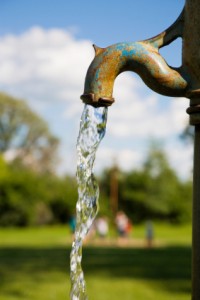 Less water from precipitation and glacial runoff will have an enormous impact on water quality in Manitoba and across the Prairies. With less renewal there will be less water in lakes, ponds and rivers. As such, they will be less able to dilute pollutants like pesticides, fertilizer and runoff from livestock.
Less water from precipitation and glacial runoff will have an enormous impact on water quality in Manitoba and across the Prairies. With less renewal there will be less water in lakes, ponds and rivers. As such, they will be less able to dilute pollutants like pesticides, fertilizer and runoff from livestock.
On this page, we look at the impacts of reduced water quality
Click a link in the list above to jump to that topic on this page.
For people
People will be at greater risk of contracting waterborne illnesses. (See Drinking water) Water bodies will be less able to buffer the effects of acid rain. Increased nutrient levels will cause algal blooms and eutrophication, making drinking water unpalatable and potentially toxic.
Unfortunately, Canadian freshwater supplies face many threats in addition to climate change that will seriously jeopardize water quality in the future: (1)
- Increased virulence – There are more diseases in the water.
- Chlorine issues – Many water-related health problems cannot be solved with more chlorine. Cryptosporidium and microcystis are resistant, while bladder cancer and developmental abnormalities may actually be chlorine-induced.
- Insufficient regulations – Municipal and/or provincial regulations that are not effective in protecting the water.
- Soil erosion, the destruction of wetlands and riparian habitat from poor land-use practices.
- Industrial farms – An increase in industrial farms that release that same amount of pollutants as a moderately sized city.
For nature
Quality issues are not reserved just for people and drinking water. Runoff transports more than water into lakes, rivers and streams. Dissolved organic carbon (DOC) is carried from the surrounding watershed into water bodies. DOC – often in the form of natural pigments, like tannins – is critical to the health of aquatic organisms. It prevents the penetration of harmful ultraviolet radiation into the water column. A lack of DOC has resulted in sunburnt fish in some Canadian lakes.
Problems for fish go beyond sunburn. Cold water fish will have to migrate to higher latitudes and altitudes to escape warming water bodies. Global warming caused by a doubling of carbon dioxide in the atmosphere will reduce habitat for cold water fish species (brook trout, for example) by 57%. Many Canadian fish species will have limited escape options as many of our major river systems flow East/West as opposed to North/South.




